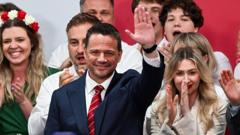If victorious, Lee Jae-myung’s approach could mend strained international relations that deteriorated under Yoon Suk Yeol’s confrontational strategy.
South Korea's Upcoming Election Poised to Shift Diplomatic Landscape

South Korea's Upcoming Election Poised to Shift Diplomatic Landscape
As presidential candidates Lee Jae-myung and Kim Moon-soo prepare for the June 3 election, the outcome could reshape South Korea's foreign policy, particularly towards North Korea and China.
In the days leading up to the June 3 presidential election, South Korean voters face a critical choice that could redefine the nation’s diplomatic strategy. The two main candidates, Lee Jae-myung and Kim Moon-soo, although differing in emphasis, largely support strengthening South Korea's alliance with the United States while re-evaluating its positions on North Korea and China.
Lee Jae-myung, currently the frontrunner according to polling data, advocates for a diplomatic approach to reduce rising tensions with both North Korea and China. He aims to restore Seoul's traditionally intricate balance amid the global competition between Washington and Beijing, a balance that former President Yoon Suk Yeol upset during his tenure. Under Yoon, whose abrupt exit in April followed controversial heavy-handed policies including martial law, relations with North Korea soured significantly. The North shifted its stance from wanting reunification with the South towards viewing it as an adversarial entity to vanquish, particularly through nuclear means.
Furthermore, President Yoon's administration heightened animosities with China, citing concerns over espionage and influence on domestic politics. “The relations between South Korea and China became the worst ever,” stated Lee Jae-myung, emphasizing the need for stabilization and management of ties.
While both Lee and his opponent Kim Moon-soo share similar foundational policies regarding national security and international relations, their strategies may diverge in execution. The electorate's decision on June 3 will notably influence the geopolitical landscape of the Korean Peninsula, and possibly dictate the future of diplomatic relations not just within the region but also in the broader global arena.
Lee Jae-myung, currently the frontrunner according to polling data, advocates for a diplomatic approach to reduce rising tensions with both North Korea and China. He aims to restore Seoul's traditionally intricate balance amid the global competition between Washington and Beijing, a balance that former President Yoon Suk Yeol upset during his tenure. Under Yoon, whose abrupt exit in April followed controversial heavy-handed policies including martial law, relations with North Korea soured significantly. The North shifted its stance from wanting reunification with the South towards viewing it as an adversarial entity to vanquish, particularly through nuclear means.
Furthermore, President Yoon's administration heightened animosities with China, citing concerns over espionage and influence on domestic politics. “The relations between South Korea and China became the worst ever,” stated Lee Jae-myung, emphasizing the need for stabilization and management of ties.
While both Lee and his opponent Kim Moon-soo share similar foundational policies regarding national security and international relations, their strategies may diverge in execution. The electorate's decision on June 3 will notably influence the geopolitical landscape of the Korean Peninsula, and possibly dictate the future of diplomatic relations not just within the region but also in the broader global arena.





















